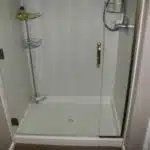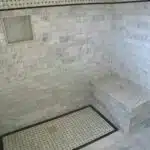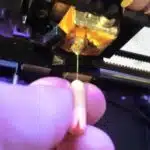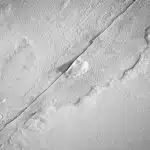It is a common experience for homeowners to notice an unpleasant odor coming from their shower drain. This smell can be unsettling and may affect the overall comfort of the living space. The presence of a sewage-like smell in the shower drain is often an indication of underlying plumbing issues that require immediate attention.
As a plumbing engineer, I have observed that this problem is caused by various factors, including clogged drains, sewer gases seeping into the house, or a dry trap. In this article, we delve into how each of these factors contributes to the unpleasant smell and what you can do to prevent it from happening again. We will also explore some simple solutions and preventive measures that homeowners can take to keep their shower drains smelling fresh and clean.
Understanding The Cause Of The Odor
Understanding the Causes of the Odor
The shower drain is an essential component of any bathroom plumbing system. However, it can be a source of unpleasant odors if not maintained properly. Understanding the causes of the odor emanating from your shower drain is crucial in finding a lasting solution to this problem. One common cause of the smell is the accumulation of hair, soap scum, and other debris in the drain trap. When left unattended, these materials can decompose and produce a foul smell that permeates your entire bathroom.
Preventive measures are crucial in preventing such odors from occurring in the first place. Regular cleaning and maintenance of your shower drain can go a long way in ensuring that it remains odor-free. You should clean out any debris or buildup from the drain trap regularly to prevent it from accumulating over time. Additionally, you can use natural cleaners such as baking soda and vinegar to keep your drain clean without damaging your pipes.
A malfunctioning plumbing system can also cause sewage-like smells to emanate from your shower drain. Broken or blocked sewer lines can cause sewage backups that emit noxious gases into your home. If you suspect that your plumbing system may be faulty, it’s important to seek professional assistance immediately to avoid further damage and health hazards.
Identifying the source of the smell requires systematic assessment of various factors including age and condition of pipes among others.
Identifying The Source Of The Smell
A shower drain that smells like sewage can be a distressing experience for homeowners. The first step in resolving this issue is to identify the source of the smell. Common causes of this problem include blockages in the drain, broken or cracked pipes, dry traps, and malfunctioning vent pipes. Blockages in the drain can result from a buildup of hair, soap residue, and other debris that prevents water from flowing freely through the pipes. This can cause an unpleasant odor to emanate from the drain.
One DIY solution for addressing this issue is to pour boiling water down the drain to break up any blockages. Alternatively, one can use a plunger to force air through the pipe and clear out any obstructions. Another effective method is to mix baking soda and vinegar and pour it down the drain. This combination will react chemically and dissolve any organic matter that may be causing the smell.
If these DIY solutions fail to resolve the issue, it may be necessary to seek professional inspection and repair options. A plumbing expert can conduct a thorough inspection of your plumbing system to determine where exactly the smell is coming from. They may also use specialized equipment such as cameras or smoke tests to locate cracks or breaks in pipes that are not visible to the naked eye. Based on their findings, they can then recommend appropriate repair options.
In summary, identifying and fixing a shower drain that smells like sewage requires proper diagnosis of its root cause. While DIY solutions such as pouring boiling water or using baking soda and vinegar may work in some cases, sometimes it’s best to leave it up to professional plumbers who have access to advanced tools and techniques for identifying issues with your plumbing system. In our subsequent section about differentiating between sewage smell and other odors we will provide more information about how you can tell if you’re dealing with a sewage problem or another type of odor coming from your shower drain.
Differentiating Between Sewage Smell And Other Odors
Identifying the source of the smell can be a difficult task, and often requires a physical inspection of the plumbing system to properly assess the issue. Common causes of sewage smells from a shower drain include a clogged drain, improperly installed plumbing fixtures, or a broken or blocked sewer line. In some cases, the smell can be caused by a buildup of organic materials in the drain trap or vent pipe. Additionally, a lack of ventilation can cause the smell to become more concentrated in the bathroom.
Identifying The Source Of The Smell
Identifying the source of the smell in your shower drain is crucial in resolving the issue. Common causes of sewage smells from shower drains include issues with plumbing vents, dry P-traps, and clogs. Plumbing vents are designed to allow air to escape from your drainage system and when blocked or damaged, it can cause a build-up of pressure resulting in a sewage-like odor emanating from your shower drain. Dry P-traps occur when there’s no water present in the trap, allowing sewer gases to seep through. Clogs in your drainage system can also lead to an accumulation of debris and stagnant water that produces unpleasant odors.
DIY solutions can be used for identifying the source of the smell, such as checking the plumbing vent on your roof for any blockages or damage. You can also pour warm water down your shower drain to refill any dry P-traps that may be causing the odor. Additionally, using natural cleaning agents like baking soda and vinegar or enzyme-based cleaners can help remove clogs and eliminate bad odors.
While DIY solutions may work for minor issues, calling a plumber is recommended if you notice persistent sewage smells coming from your shower drain. A professional plumber would have specialized tools and equipment necessary for identifying and fixing severe issues within your drainage system. Prevention tips include regular cleaning and maintenance of your plumbing system, avoiding pouring grease or oil down the drain, disposing of hygiene products properly, and not flushing anything except toilet paper down toilets.
In conclusion, identifying the source of sewage smells from shower drains is essential in resolving this unpleasant issue. By knowing common causes like issues with plumbing vents, dry P-traps, and clogs; you can take appropriate DIY measures like checking vents for blockages or pouring warm water down drains to refill dry P-traps. However, persistent odors require calling a professional plumber while prevention measures are focused on regular maintenance and responsible disposal practices.
Common Causes Of Sewage Smells
When it comes to differentiating between sewage smell and other odors, it is crucial to identify the common causes of sewage smells in your home. One of the most common causes of sewage smells is issues with plumbing vents. Plumbing vents are designed to allow air to escape from your drainage system, and when blocked or damaged, they can cause a build-up of pressure resulting in an unpleasant odor emanating from your shower drain. Other common causes include dry P-traps and clogs in your drainage system.
Dry P-traps occur when there’s no water present in the trap, allowing sewer gases to seep through. This can happen when a sink or shower hasn’t been used for an extended period of time. Clogs in your drainage system can also lead to an accumulation of debris and stagnant water that produces unpleasant odors. These are some of the most common causes of sewage smells that homeowners may encounter.
If you suspect any of these issues could be causing the sewage smell in your home, there are some common solutions available. DIY remedies such as checking the plumbing vent on your roof for any blockages or damage, pouring warm water down your shower drain to refill any dry P-traps that may be causing the odor, and using natural cleaning agents like baking soda and vinegar or enzyme-based cleaners can help remove clogs and eliminate bad odors. However, if you notice persistent sewage smells coming from your home’s plumbing system, calling a professional plumber is recommended for proper diagnosis and repair.
Inspecting The Drain For Clogs
To determine why your shower drain smells like sewage, the first thing you should do is inspect it for clogs. A clogged drain can cause water to back up and become stagnant, leading to unpleasant odors. Checking for clogs involves removing the drain cover and visually examining the opening. If there is any visible debris or hair, remove it using a pair of pliers.
If you do not see any visible obstructions in the drain, the next step is to use a plunger. A plunger can help dislodge any blockages that may be further down the drainpipe. To use a plunger, fill the shower with enough water to cover the bottom of the plunger cup. Place the plunger over the drain and push down firmly several times, creating suction that will hopefully remove any blockages.
Checking for leaks is also an important step in determining why your shower drain smells like sewage. Leaks can occur at various points in your plumbing system and can allow sewer gases to escape into your home. Check around the base of your toilet and under sinks for signs of moisture or leaking pipes. Addressing leaks promptly can prevent more significant problems from developing down the line.
By inspecting your shower drain for clogs and checking for leaks, you can usually determine why it smells like sewage. However, if these steps don’t solve the problem, it’s time to move on to checking the drainage system itself. This involves examining pipes connected to your shower as well as those outside of your home that connect to municipal sewers.
Checking The Drainage System
To determine why your shower drain smells like sewage, it is necessary to inspect the drainage system. The odor could be due to a clog in the drain or vent stack, which would require professional help. Alternatively, it could be caused by dry traps that have become stagnant and are allowing sewer gas to escape.
Regular maintenance of the drainage system can prevent these problems from occurring. It is recommended to have your plumbing system inspected at least once a year by a licensed plumber. This will ensure that any potential issues are caught early on and can be resolved before they become costly and hazardous.
Early detection of drainage problems is crucial for preventing unpleasant odors and health hazards. If you notice any unusual smells or slow draining water, do not hesitate to contact a professional plumber immediately. A small investment in preventative maintenance can save you time, money, and headaches down the road.
Moving forward, addressing dry traps will be our next topic of discussion. Dry traps occur when there is not enough water flowing through them to keep them properly sealed. In the next section, we will explore how dry traps can be identified and resolved effectively to prevent further complications with your plumbing system.
Addressing Dry Traps
The presence of a dry trap can be identified through the odors present in the bathroom, such as a sewage smell. The most effective way of unclogging a dry trap is to use a plumbing snake and feed it through the drain until it reaches the clog. If a plumbing snake is not available, a plunger can be used to break apart a clog and restore flow. After unclogging, a water-filled trap should be created to ensure the trap remains full and odors are not able to escape.
Identifying A Dry Trap
There’s nothing more unpleasant than walking into your bathroom and being hit by the overwhelming stench of sewage emanating from your shower drain. The odor can be so strong that it can make you feel sick and embarrassed, especially when guests are around. Identifying a dry trap is often the culprit behind this foul smell.
Identifying common causes of a dry trap is essential in addressing this plumbing issue. A dry trap occurs when the water seal inside a pipe or drain dries out, allowing sewer gases to escape into your home. This situation can happen if you have not used a particular drain or fixture for an extended period or if there is insufficient water flow in the pipes to maintain the water seal.
Prevention tips for dry traps include running water regularly through unused drains, ensuring proper ventilation in your plumbing system, and regular maintenance checks by professional plumbers. By taking these simple preventive measures, you can avoid unpleasant odors and keep your home smelling fresh and clean all year round. Remember that identifying a dry trap early on is crucial in preventing further damage to your plumbing system and avoiding expensive repair costs down the line.
Unclogging A Dry Trap
After identifying a dry trap in your plumbing system, the next step is to address the issue and find ways to unclog it. One of the most common causes of a dry trap is a blockage in the pipe or drain, preventing water from flowing through and maintaining the water seal. This blockage could be caused by hair, soap scum, or other debris that accumulates over time.
To unclog a dry trap, several cleaning techniques can be used depending on the severity of the blockage. A simple method involves pouring boiling hot water down the drain to loosen any buildup and restore water flow. Another option is using a plunger to create suction and dislodge any stubborn clogs. For more severe cases, chemical drain cleaners or plumbing snakes may be necessary to clear out the blockage.
Regular maintenance tips can also prevent future occurrences of dry traps. In addition to running water regularly through unused drains, homeowners should clean their pipes and drains periodically using natural cleaning agents like vinegar and baking soda. Professional plumbers can also inspect and maintain your plumbing system regularly to ensure proper ventilation and identify any potential issues before they turn into major problems.
By taking proactive measures like regular maintenance checks and implementing proper cleaning techniques when necessary, homeowners can effectively address and prevent dry traps in their plumbing systems. These efforts not only keep your home smelling fresh but also ensure that your plumbing system operates smoothly for years to come.
Clearing The P-Trap
Addressing dry traps is essential to prevent unpleasant smells from emanating in your bathroom. When a trap dries up, it allows sewer gases to enter the room, resulting in an unpleasant smell. However, if you have already addressed this issue and your shower drain still smells like sewage, then there might be another problem.
The most likely cause of a foul smell coming from your shower drain is a clogged P-trap. This plumbing fixture is designed to hold water that acts as a barrier between the sewer system and your home’s drainage system. If the P-trap gets clogged with hair or soap scum, it can result in a backup of sewage gas into your bathroom.
If you suspect that a clogged P-trap is causing the bad odor from your shower drain, you can try cleaning it yourself using household items such as baking soda and vinegar. However, if you are not confident in your DIY skills or do not have the necessary tools, it may be best to hire a professional plumber for help. They can use specialized cleaning methods and equipment to clear out any blockages effectively.
- Cleaning Methods:
- Baking Soda and Vinegar
- Plumber’s Snake
In summary, having an unpleasant smell emanating from your shower drain can be frustrating and embarrassing. While addressing dry traps is essential for preventing bad odors in the bathroom, if there’s still a problem after doing so, then clearing out the P-trap could solve the issue. You can attempt this on your own with household items or seek professional help for better results. In our next section, we will discuss how flushing the drain with hot water can also help eliminate unwanted odors from your shower drain.
Flushing The Drain With Hot Water
One of the most efficient ways to prevent your shower drain from smelling like sewage is by flushing it with hot water. This simple yet effective process can help minimize the accumulation of bacteria and other harmful substances that can cause unpleasant odors in your bathroom. Hot water has been known for its ability to dissolve grease, oils, and other organic materials that tend to clog drains, making it an ideal solution for keeping your shower drain clean and odor-free.
The benefits of using hot water to flush drains are many. First, it helps remove any buildup of hair, soap scum, or other debris that may be accumulating in your pipes. Second, hot water can kill any bacteria or fungi that may be growing in damp areas within your plumbing system. Finally, hot water is a natural sanitizer and disinfectant that can help eliminate foul odors caused by mold or mildew.
So how often should you flush your shower drain with hot water? The answer depends on how frequently you use your shower and how much hair or debris is washed down the drain. Generally speaking, it’s a good idea to flush your shower drain with hot water at least once a week to prevent any buildup of bacteria or other substances that can cause unpleasant odors. However, if you notice a persistent smell coming from your drain even after flushing it with hot water, this could be an indication of a more serious plumbing issue that requires professional attention.
Transition: Now that we know the benefits of using hot water to flush our shower drains let’s explore another natural solution for eliminating unpleasant smells – using baking soda and vinegar.
Using Baking Soda And Vinegar
- Mixing baking soda and vinegar is a common method of cleaning a clogged shower drain.
- The combination of baking soda and vinegar creates a chemical reaction that can help to break down organic matter and debris to clear the drain.
- Baking soda and vinegar are both natural, cost-effective, and non-toxic cleaning agents, making them a popular choice for drain cleaning.
- The benefit of using baking soda and vinegar is that it can help clear clogged drains more quickly and easily than traditional methods.
- Cleaning with baking soda and vinegar is best done by pouring a pot of boiling water down the drain first, followed by a mixture of baking soda and vinegar.
- Once the mixture has had time to sit, it should be followed up with another pot of boiling water to flush the drain and clear it of any odors or blockages.
Mixing Baking Soda And Vinegar
The smell of sewage emanating from your shower drain can be a source of great discomfort and disgust. It is a common problem in many households that can be caused by various reasons, such as clogs or blockages, sewer line damage, or even the accumulation of bacteria and other organic matter in the pipes. However, one effective solution to this problem is the use of baking soda and vinegar.
Baking soda and vinegar are two household products that have been used for centuries for their cleaning properties. When mixed together, they create a fizzy reaction that helps break down dirt, grime, and other organic matter in pipes. This makes it an excellent alternative to harsh chemical cleaners that may cause damage to your pipes over time.
Using baking soda and vinegar not only helps remove odors but also offers numerous benefits when it comes to cleaning your bathroom fixtures. They are non-toxic, eco-friendly alternatives that are safe for you and your family. Moreover, unlike chemical cleaners, they do not leave any residue behind or emit harmful fumes that can affect your health.
In conclusion, mixing baking soda and vinegar is an effective way to eliminate unpleasant smells emanating from your shower drain. It is also a safe and eco-friendly alternative to harsh chemical cleaners. However, if the odor persists despite using these products or if you suspect there may be other underlying issues causing the smell, it may be best to seek professional plumbing services for further investigation.
Benefits Of Using Baking Soda And Vinegar
Using baking soda and vinegar as DIY solutions for household cleaning has become increasingly popular in recent years. These two eco-friendly options are not only cost-effective but also offer numerous benefits that make them a go-to for many homeowners. When it comes to plumbing issues, using baking soda and vinegar can be an effective way to eliminate unpleasant smells emanating from your shower drain while being safe for you and the environment.
One of the biggest advantages of using baking soda and vinegar is their ability to break down dirt, grime, and organic matter without causing any damage to your pipes. Harsh chemical cleaners may seem like a quick fix, but they often cause more harm than good. These products can corrode your pipes over time, leading to costly repairs or replacements. Baking soda and vinegar are gentle yet effective alternatives that help keep your pipes clean and free from clogs.
Additionally, these ingredients are non-toxic, making them safe for use around children and pets. Unlike chemical cleaners that leave behind harmful residues or emit unpleasant fumes that can affect your health, baking soda and vinegar are natural substances that do not pose any harm to you or the environment. By using these eco-friendly options, you not only keep your home clean but also contribute to reducing environmental pollution.
In conclusion, using baking soda and vinegar as DIY solutions for household cleaning is a smart choice for those who want effective results without harming the environment or risking their health. They offer numerous benefits such as being gentle on pipes, non-toxic, and affordable alternatives to harsh chemical cleaners. Incorporating them into your regular cleaning routine can help maintain a healthy living space while minimizing your carbon footprint.
Cleaning With Baking Soda And Vinegar
Baking soda and vinegar have been widely used as natural cleaning solutions for many years. These two substances are known for their powerful cleaning abilities and are commonly found in most households. Baking soda benefits include its ability to work as a mild abrasive that can remove stains, dirt, and grime from various surfaces. It is also an excellent deodorizer that can eliminate unpleasant odors effectively. On the other hand, vinegar uses include its acidic properties, which make it an effective disinfectant and stain remover.
When it comes to cleaning with baking soda and vinegar, there are numerous ways to use these two ingredients in combination or separately. For example, mixing baking soda with water creates a paste that can be used to clean surfaces such as countertops, stovetops, and sinks. Similarly, pouring vinegar down a drain helps dissolve grease buildup and eliminates unpleasant smells from the pipes. The combination of these two natural ingredients can also be used to clean showerheads, toilets, and even laundry.
One of the advantages of using baking soda and vinegar for cleaning is that they are non-toxic and environmentally friendly. Unlike chemical cleaners that contain harmful substances that can cause health problems or pollute the environment, baking soda and vinegar are natural substances that do not cause any harm when used correctly. Moreover, they are readily available at affordable prices in most grocery stores, making them a cost-effective solution for homeowners who want to maintain a healthy living space without breaking the bank.
Pouring Bleach Down The Drain
Using bleach to clean out shower drains is a common solution for homeowners who experience foul odors emanating from their drains. Bleach is an easily available household item that can be used as a disinfectant, and it can effectively kill bacteria, fungi, and other microorganisms that may cause unpleasant smells.
One of the benefits of using bleach is its ability to break down organic waste matter that accumulates in the shower drain over time. This type of buildup can cause blockages and slow drainage in the plumbing system, leading to unpleasant odors. Pouring bleach down the drain will help dissolve this debris and keep your drain smelling fresh.
However, some people prefer not to use bleach due to its potential environmental impact or because it may harm septic systems. There are alternatives to using bleach that are just as effective in cleaning out shower drains. These include vinegar, baking soda, and other natural cleaning agents that are less harmful to the environment and safe for septic systems.
Installing A Drain Cover
Have you noticed an unpleasant odor coming from your shower drain? This could be a result of sewage backup or stagnant water. Not only is this smell unpleasant, but it can also be harmful to your health. The good news is that installing a drain cover can help prevent these issues.
Choosing the right drain cover for your shower is essential. There are several options available, including mesh covers and hair catchers. Mesh covers are great for preventing small particles from entering the drain, while hair catchers are ideal for preventing hair buildup in the pipes. It’s important to consider your needs when selecting a drain cover and ensure that it fits properly.
Regular maintenance of your shower drain is crucial to prevent the buildup of debris and avoid any unpleasant odors. By cleaning out the drain regularly and using a drain cover, you can avoid potential blockages and maintain good hygiene in your bathroom.
Incorporating regular maintenance into your routine can save you money on costly repairs down the line. However, if you notice persistent odors or clogs in your shower, it may be time to hire a professional plumber to assess the issue. They can provide expert advice on how to fix any plumbing problems and keep your shower smelling fresh and clean for years to come.
Hiring A Professional Plumber
If your shower drain smells like sewage, it’s essential to hire a professional plumber. A licensed and experienced plumber has the knowledge and equipment necessary to locate and correct the source of the odor. DIY solutions may provide temporary relief, but they won’t address the underlying problem.
Benefits of professional plumbing include:
- Thorough inspection: A professional plumber will conduct a thorough inspection of your plumbing system to identify any leaks, clogs, or damage that could be causing the odor.
- Safe repairs: Plumbing work can be dangerous if not performed correctly. A professional plumber has the training and experience to make repairs safely without risking injury or further damage to your plumbing system.
- Long-term solutions: While DIY solutions may provide temporary relief, they often don’t address the root cause of the problem. A professional plumber will provide long-term solutions that prevent future issues from arising.
DIY solutions for shower drain odor may seem like a cost-effective option, but they can do more harm than good. Pouring chemicals down your drain can damage your pipes and harm the environment. Additionally, DIY solutions are often ineffective at addressing the underlying issue.
Incorporating preventive measures for avoiding future odors is crucial after hiring a professional plumber. These measures include regular maintenance checks by a certified plumbing expert, proper disposal of harmful substances such as oils and grease, as well as avoiding flushing down waste materials such as diapers or sanitary pads in toilets. Ignoring these preventive measures can lead to recurring odors even after hiring a professional plumbing service provider.
Preventive Measures For Avoiding Future Odors
Just when you thought that hiring a professional plumber would be the end of your shower odors, it’s not uncommon to find that the smell returns. The reason for this is most likely due to poor maintenance practices. As a plumbing expert, I would like to suggest some preventive measures that can help you avoid future unpleasant odors in your bathroom.
Regular cleaning is essential to maintaining your shower drain and preventing bad smells. Even though it may seem like a daunting task, cleaning your shower drain every few weeks can help prevent hair and other debris from clogging the pipes. A simple mixture of baking soda and vinegar can work wonders in unclogging any buildup in your pipes. Just pour the mixture down the drain, let it sit for a few hours, and then flush with hot water.
Proper ventilation is another crucial factor in maintaining a clean and odor-free bathroom. Without adequate ventilation or airflow, moisture can accumulate on surfaces such as walls, floors, and ceilings, leading to mold growth and unpleasant odors. Therefore, make sure you have proper ventilation installed in your bathroom or consider leaving the window open during and after showers to help remove excess moisture.
Maintaining your shower drain doesn’t have to be complex or time-consuming. With regular cleaning practices and proper ventilation in place, you can prevent future odors from emanating from your shower drain. By following these simple steps regularly, you can enjoy a fresh-smelling bathroom without worrying about any potential plumbing issues.
Maintaining Your Shower Drain
Regular cleaning and proper disposal are essential in maintaining your shower drain. Over time, hair, soap scum, and other debris can accumulate in your drain, causing a foul odor to emit from it. To prevent this from happening, make sure to clean your shower drain regularly to remove any buildup that may be present.
When cleaning your shower drain, it’s important to use the proper tools and techniques. A plunger or drain snake can help clear out any debris that may be causing the odor. Also, be sure to properly dispose of any materials used in the cleaning process, such as hair or paper towels. Failure to do so could lead to clogs or other plumbing issues.
By following these simple steps for maintaining your shower drain, you can keep it smelling fresh and clean. Regular cleaning and proper disposal will help prevent odors from forming in the first place, ensuring that you always have a pleasant showering experience.
Concluding Thoughts On Shower Drain Odors
Preventing odors in shower drains is a common problem that many homeowners face. It can be frustrating to deal with a smelly shower drain, especially when it seems like the odor won’t go away no matter what you do. However, there are several ways to prevent odors from developing in your shower drain.
Firstly, it’s important to clean your shower drain regularly. Hair, soap scum, and other debris can build up over time and create a breeding ground for bacteria that cause unpleasant odors. To prevent this from happening, use a drain cleaner or snake to remove any clogs or blockages that may be causing the smell.
Secondly, addressing common misconceptions about how to clean your shower drain can also help prevent odors. For example, many people believe that pouring bleach down the drain will eliminate the smell. While this may temporarily mask the odor, it doesn’t actually address the root cause of the problem.
Lastly, installing a drain trap or plug can also help prevent odors from escaping into your bathroom. These devices work by trapping water in the pipes and preventing sewer gases from entering your home through the shower drain.
By following these simple tips and tricks, you can keep your shower smelling fresh and clean all year round. Remember to take preventative measures to avoid unpleasant smells and always address any issues as soon as they arise. A little bit of effort goes a long way when it comes to maintaining a healthy plumbing system in your home.
Conclusion
Shower drain odors can be a nuisance and a source of discomfort for homeowners. To address this problem, it is important to understand the cause of the odor and identify its source. Inspecting the drain for clogs and checking the drainage system are necessary steps to take before hiring a professional plumber.
Preventive measures such as maintaining your shower drain can help avoid future odors. Regular cleaning of your bathroom, using natural cleaners like vinegar and baking soda, can also keep your shower drain smelling fresh.
As plumbing experts, we recommend taking action at the first sign of any odor coming from your shower drain. By following these simple steps, you can maintain a clean and healthy bathroom environment free from unpleasant odors. So why wait? Take control of your bathroom today and ensure that you have a comfortable space to relax in after a long day.
Image Credits
- “Hot Raw Sewage” by Trey Ratcliff (featured)

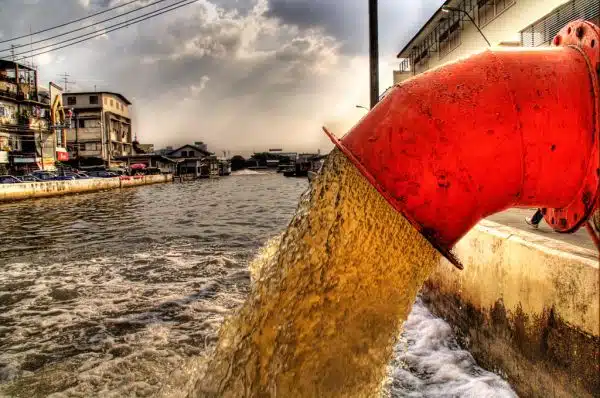


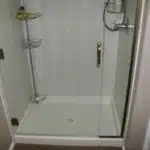
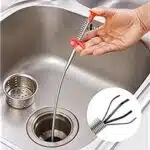
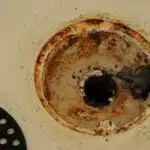
![How To Get Hair Out Of A Bathtub Drain 7 2/365 [Bathtub Drain]](https://green-life.blog/wp-content/uploads/2023/05/cOEu5edpkejq-150x150.jpg.webp)
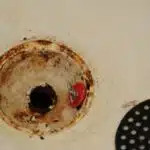
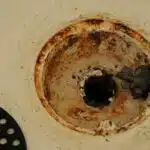





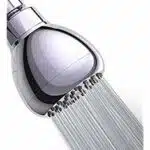


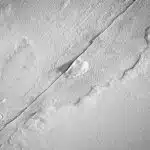

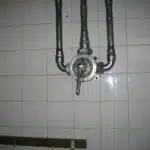
![How To Remove Perfume Odors From Clothes 21 For pungency, strength, durability and delicacy of odor. Read's Grand Duchess Cologne. [back]](https://green-life.blog/wp-content/uploads/2023/05/b-myfoHrx-jq-150x150.jpg.webp)
